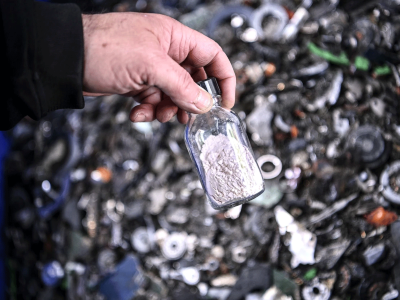The race of superpowers to regulate access to ‘critical minerals’ — such as cobalt, copper, lithium and rare-earth elements — poses enormous challenges to global stability. These minerals are crucial ingredients in batteries, electronics, solar panels and computer chips. And demand for them is soaring: it will more than quadruple by 2040 for clean-energy technologies alone (see go.nature.com/3zHuGNm). The United States, China and Europe are taking drastic steps to secure their supplies. In January, US President Donald Trump issued executive orders to promote domestic mining and processing of these essential minerals, as he did during his first term and as his predecessor, Joe Biden, did, too. Trump has even offered to buy mineral-rich Greenland, to the dismay of Denmark, of which the island is a territory. And he is calling on Ukraine to relinquish a large chunk of its critical minerals to the United States as part of a peace deal with Russia.
Meanwhile, in December, China restricted exports of critical minerals to the United States after the latter blocked the transfer of chips to the former. China controls the supply chains, including the processing, of most critical minerals and is heavily invested in mining throughout Africa, Latin America and Central Asia. The United States and the European Union have tried to challenge China’s monopoly by securing their own mining contracts, including in the Democratic Republic of the Congo and Peru.
Risks of conflict, violence and crimes over these materials are growing. For instance, in the Democratic Republic of the Congo, conflicts have erupted in mineral-rich provinces such as Haut-Katanga and Nord-Kivu. These are being fuelled by neighbouring countries, such as Rwanda and Uganda, which are encouraging the smuggling of minerals across borders to enrich themselves. Illicit artisanal mining — small-scale operations with minimal equipment — is on the rise and has produced a tug of war between the authorities and citizens to claw these materials out of the ground.
How to build a circular economy for rare-earth elements
This race is increasingly causing damage to health, society and the environment. And the weak enforcement of environmental and social standards in low-income nations rich in critical minerals is concerning. Extraction is often associated with deforestation, biodiversity loss, water pollution and child labour.
A debate is raging over whether to boycott critical minerals mined in conflict zones and where people are forced into labour. But such boycotts alone are unlikely to sway governments to do right by their citizens. Nations and multinational corporations must push for change.
That won’t be easy at a time when many countries are switching their priorities away from global public goods and towards domestic ones. Instead of focusing on issues such as global stability, climate and the environment, they are boosting jobs at home and reshoring key industries, for instance. By issuing a flurry of tariffs, the Trump administration has unleashed a global trade war. After Trump’s order to freeze the work of the US Agency for International Development (USAID) and to review US engagement in international organizations, the future of these agencies seems bleak. But such organizations should stand firm.
To confront these challenges, the global community must find better ways to produce public goods that are essential for people’s well-being. This means taking a bottom-up, rather than top-down, approach by amplifying the work and voices of local organizations and civil society. For instance, communities involved in critical-mineral extraction worldwide could be mobilized to shape local practices as well as environmental and social mining standards. They could be helped by non-governmental organizations, including law firms, who are pushing for more-responsible mining.



